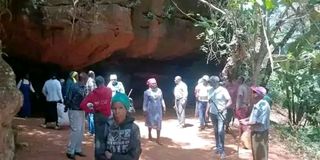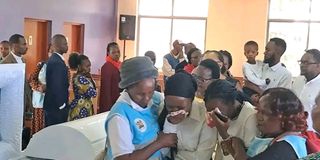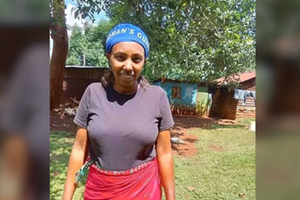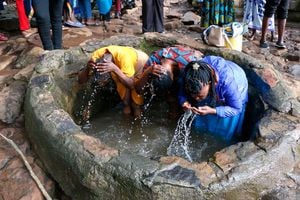
Inside Kimunyu shrines in Gatundu South Constituency that the government closed on January 23, 2024 after a woman, Beth Muthoni, 44, was found dead on January 19, 2024.
Even after Kenya gained independence in 1963, the iconic Kimunyu caves in Gatundu that were used by Mau Mau freedom fighters, have over the years remained a magnet for visitors seeking divine intervention.
The intricate caves that have River Thiririka snaking through them are a web of steep terrain and huge boulders that served the freedom fighters well in their attack and retreat strategy as they engaged British colonial forces.
The site, near the home of founding President Jomo Kenyatta in Gatundu, has been transformed by hundreds of Christians into a shrine with pilgrimage visits to seek tranquillity and time with their maker.
The Kenya Cultural Centre Council board chairman Kung'u Muigai on Sunday, January 18, 2025, told Nation.Africa that "these caves that are near my home village have over time been transformed into a multifaceted church that has no known specific followers".
Mr Muigai, who is a scion of the Kenyatta family, said that other than those going to pray, the site has also gained notoriety as a safe haven for suspected criminals.
"What is known is that prayers happen there alright, but there are also suspicious activities that pop out of those caves, including being used by cattle rustlers as well as hideouts for serious criminals," he said.
The caves were in the news again this week after the mystery death of Ms Beth Muthoni, 44. Days later — on Thursday, January 23, 2025 —security officials closed the site after ordering pilgrims to leave. Noexplanation was offered as armed police moved in and interrupted those in prayers.

Burial ceremony of the late Beth Muthoni,44, who was found dead in Kimunyu shrine on January 19, 2025.
Kiambu Senator Karungo Thang'wa on Thursday said that while freedom of worship is supreme and guaranteed in the constitution, protecting lives and property is also paramount.
Mr Thang'wa called for a win-win situation where pilgrimage is not criminalised when security agencies fail to guarantee safety.
"I urge for a well-thought-out action plan. It is not right to violently disrupt worshippers and march them in single file like typical criminals. Let prayers be but secure the participants," he said.
It was not the first time the site had been closed for security reasons. One of the closures that lasted only two weeks was effected in 2017 when police officers raided the place, ordered all pilgrims out and maintained armed security for the period.
Gatundu Police boss Joshua Nyasimi and local administrators led the closure citing the caves being transformed into a criminal den.
Mr Nyasimi had cited a case whereby the special crime prevention unit crack squad had traced two victims of kidnap into the cave.
"Two weeks to the closure order, a schoolgirl had been raped in the caves while another elderly pilgrim had been rescued from a gang of rapists," he said.
Gatundu Deputy County Commissioner Abdikadir Godana said residents had complained that the caves were being used as a hideout for criminals.
He revealed that a police raid into the caves at night had led to the arrest of 10 suspected criminals masquerading as pilgrims.
He added that cases of cows, goats and sheep being stolen in the village have in recent times reached alarming levels, with residents saying the thieves have been using the caves to hide the animals before eventually selling them to butchers.
But political pressure, including accusations that the government was waging war against religion, has often forced the officers to withdraw and allow the pilgrims to continue with their activities.
"What is suspicious is that area security officers never come out strongly to address the obvious interrelations between worship and crime, sometimes the place being ordered shut but immediately coming back to normal activities,” Mr Muigai said.
He points out that the site has been declared banned for prayers more than a dozen times but in all instances silently reopened.
"You know how this society of ours works. Anything to do with worship attracts a lot of attention. When these caves have been profiled as dangerous for the worshippers, they insist that the spiritual world is yet to reveal to them that they are risking their lives...and the government retreats to wait for that revelation," Mr Muigai said.
He added that the government agencies must remain wary that their work is to protect life and property without biases even if edged when religion is involved.
Mr Kiragu Thuku, 88, who lives near the cave says he remains puzzled by the number of people the site attracts.
"People from across the country have been trooping to these caves to pray for as long as I can remember. People come here saying God has revealed to them that He is to meet their needs here...I don't exactly know how true this is since I am not a believer in praying in the bushes," says Mr Thuku.
He also explains that the caves are situated on private land, some being along the riparian of the Thiririka River. Often, things appear to go well —until disaster strikes.
"The deaths would be associated with the worshippers slipping or tripping and falling into the deep trenches. In rainy seasons, Thiririka River would swell and once a worshipper fell into it, its waters would sweep him or her away to beneath the huge rocks," Mr Thuku said.
He says: "I have witnessed more than 50 bodies in the past 30 years being retrieved, some fasting to death, others being of sick worshippers told they would receive healing if they prayed here while others becoming accident victims in the harsh terrain of the caves."
It is such undocumented pilgrimage activities that have come home to roost with last Saturday's death of Ms Beth Muthoni, whose body was retrieved from the caves.
The mother of two was a member of the Emmanuel Breakthrough Gospel Ministries Church in the nearby Mutomo market.
"She had gone to pray in the caves accompanied by three women and a man. She was to pray and come back home in the evening but she had not done so by Friday morning prompting us to launch a search for her," says her sister Ms Anne Wanjiku.
She adds that after reporting her missing at the Kimunyu police patrol base and at the Gatundu South Directorate of Criminal Investigations offices, a search for her was commenced.
"Unfortunately, she was found dead, her head severed and stuck between rocks as her torso remained sprawled nearby. Some of her teeth missing. To us it was murder most foul," Ms Wanjiku narrates.
However, Kiambu county police boss Mr Michael Muchiri was torn between two explanations: first saying it could be murder before suggesting the woman might have been a victim of an accident.
Mr Muchiri said investigations are still ongoing as the family said it would take nothing less than the arrest of all suspects that might have participated in her death.
"I have a very active and able police commander in the area and I am sure he will have his team come up with answers as to what transpired," he said.
While the caves have been a hot potato with security agents in the area being torn between moving in and closing the shrine, politicians looking at the votes of the pilgrims, and residents have continued to be witnesses of the divided opinion.
A report by the Gatundu Security Committee dated May 18, 2023, indicated that nine people had been retrieved dead from the shrine.
"Two were victims of starving to death, one was a clear case of falling into the deep caves, three others appearing to have been attacked, two had drowned while another died a distance away after leaving the cave," the report reads.
The report cited an incident where police on patrol encountered total strangers of the opposite sex praying in pairs inside the caves.
"In one unique incident, we found a Rwandese man with a local woman inside one of the caves at around 9 pm and interestingly, despite both saying they were strangers to each other, the woman refused our efforts to have her evacuated,' the report reads.
The operation that bumped into the Rwandese is indicated to have been led by the then Gatundu South Police Commander.
Saying the activities in the shrine were a security risk since criminals had infiltrated the pilgrimage tours, the security committee report proposed that the County government of Kiambu start regulating the visits to the area.
"The county can consider transforming the so-called shrine into an income-generating facility where charges of about Sh300 or Sh500 could be imposed on those seeking to pray in it...local youths be recruited to earn (money) as ushers as well as community policing agents to keep the area secure," the report adds.
However, the recommendations hit a snag when it emerged that the shrine was on private land.
Mr Joseph Kibe is documented as among those who came up to claim ownership of parts of the shrine. In his submission, he supported the closure of worshipping activities in the shrines saying "I have witnessed death and runaway crime right under my nose".
Mr Kibe said closing the pilgrimage tours into his land would save many worshippers from facing security challenges.
"I have in the past written to the Deputy County Commissioner, Police boss and members of the National Government Administration Officers asking them to help me bring these worships to a close but the faithful resisted," he said.
mwangilink@gmail.com







